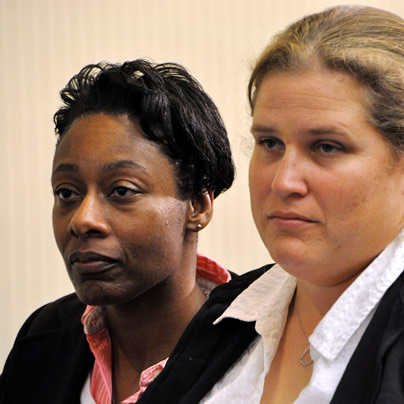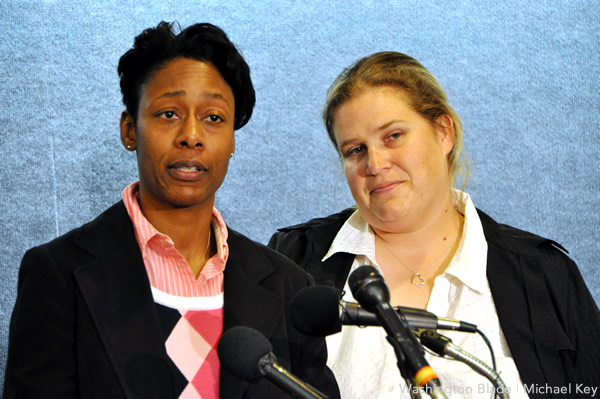News
Court rules against law barring gay couples from veterans benefits
Judge finds U.S. gov’t has no rational basis for withholding benefits from same-sex spouses


Tracey (left) & Maggie Cooper-Harris have sued to received veterans benefits that were denied under Title 38 (Blade file photo by Michael Key).
A federal district judge in California ruled on Thursday that enforcing Title 38 — the portion of U.S. code governing veterans benefits — to bar former troops in same-sex marriages from receiving spousal veterans benefits is unconstitutional.
U.S. District Judge Consuelo Marshall, a Carter appointee, grants summary judgment in favor of lesbian veteran plaintiff Tracey Cooper-Harris by determining the U.S. government lacks any rational basis in withholding these benefits. Marshall finds current law doesn’t advance gender equity or military purposes.
“Title 38 is not rationally related to the military’s commitment to caring for and providing for veterans benefits,” Marshall writes. “[T]he court permanently enjoins Defendants from relying on [Title 38] or Section 3 of [DOMA] to deny recognition of Plantiffs’ marriage recognized by the State of California.”
It wasn’t immediately clear Thursday night whether the ruling means the U.S. government is enjoined from blocking benefits for all gay married veterans or only the plaintiffs who filed suit in the case. However, the court declared the law unconstitutional, not just as applied to the plaintiffs.
Caren Short, staff attorney for the Southern Poverty Law Center, said Friday the decision applies “just to our clients Tracey and Maggie,” but believes the administration can implement the ruling on a nationwide basis.
“We’re hopeful that now that a federal court has declared these definition in Title 38 unconstitutional that the VA will be able take steps toward providing equal benefits now to everyone,” Short said.
Jon Davidson, legal director Lambda Legal, said whether the administration will apply the ruling only to plaintiffs or other gay veterans is yet to be seen.
“In most instances, DOJ takes the position that a district court ruling against a federal agency is not binding on the agency beyond the jurisdiction of the court issuing the ruling, but I do not know what DOJ will say here, if they do not appeal, as they may simply accede to the ruling on a nationwide basis,” Davidson said.
The Justice and Veterans Affairs departments didn’t immediately respond to a request to comment Friday morning on what their next steps will be as a result of the ruling.
The lawsuit, known as Cooper-Harris v. United States, was filed in February 2012 by the Southern Poverty Law Center on behalf of Tracey Cooper-Harris, a lesbian veteran of the Iraq and Afghanistan wars who was seeking veterans spousal benefits for her spouse, Maggie Cooper-Harris. Tracey was diagnosed with multiple sclerosis and later found it was connected to her service, but was unable to receive spousal disability benefits.
The Southern Poverty Law Center asked the court to overturn both Section 3 of the Defense of Marriage Act, which has since been overturned by the Supreme Court, and Title 38 with respect to its hold on spousal benefits for gay veterans on the basis that the laws violate due process under the Fifth Amendment.
In a statement provided by SPLC, Tracey Cooper-Harris expressed gratitude the court ruled in favor of granting veterans benefits that will benefit her and her spouse.
“Maggie and I have waited so long to receive the same benefits other married veterans and their spouses receive,” Tracey said. “We are overjoyed that the court has ended the federal government’s discrimination against gay and lesbian veterans and their spouses. Judge Marshall’s ruling confirms that the service of gay and lesbian veterans and the sacrifices of their spouses are valued equally in the eyes of the law.”
Even though the U.S. Supreme Court has struck down the Section 3 of DOMA, the U.S. government has still withheld veterans spousal benefits — such as disability and joint burial benefits — from veterans in same-sex marriages on the basis of Title 38. That law, which governs veterans benefits, defines spouse in opposite-sex terms independent of DOMA.
Just this week, the Washington Blade made public a letter from Secretary of Veterans Affairs Eric Shinseki stating that U.S. government is still withholding spousal benefits for veterans marriages. The letter says the department is still reviewing with the Justice Department whether the Obama administration can afford these benefits following the DOMA decision.
Stephen Peters, president of the LGBT group American Military Partners Association, commended the court for reaching the decision that Title 38 is unconstitutional.
“Title 38 clearly violated the constitutional rights of our military veteran families,” Peters said. “This decision sets our nation on a path to honoring and serving all of our veterans and their families, regardless of their sexual orientation.”
Doug NeJaime, who’s gay and law professor at University of California, Irvine, said the ruling is positive, but noted other statutes still exist barring veterans spousal benefits from flowing to same-sex couples.
“The ruling applies the reasoning of Windsor in a logical way and represents an important step forward on veterans benefits,” NeJaime said. “However, veterans benefits have traditionally not used a place of celebration rule, meaning that unlike in the general military context, same-sex couples would not automatically be eligible for benefits based on their marriage.”
It’s unclear how the case could proceed any further to higher court. U.S. Attorney General Eric Holder announced the Justice Department wouldn’t defend Title 38 against legal challenges that contest the law on the basis that it unfairly deprives same-sex couples of veterans benefits. The House Republican-led Bipartisan Legal Advisory Group, which had taken up defense of DOMA after the Obama administration stood down, withdrew as a party from the case in July.
SPLC’s Short she doesn’t believe anyone can appeal the case now that there are no opposing parties in the lawsuit.
“On the issue of Title 38’s constitutionality, it’s doesn’t appear that there will be anyone to appeal,” Short said. “The Department of Justice said that they also agreed that Title 38 is unconstitutional. They filed a brief in support of our motion for summary judgment, so it would be strange for them to appeal the ruling, which was essentially the outcome that they were advocating for. So on the issue of Title 38’s constitutionality, there isn’t likely to be an appeal.”
But Lambda’s Davidson said the Justice Department still may appeal the decision on the grounds that the federal district court in California doesn’t have jurisdiction to hear the case.
“While DOJ is not defending on the merits, it has been contesting whether the Title 38 challenge belongs in federal district court as opposed to the specialized administrative court that deals with VA benefit issues,” Davidson said. “The judge ruled against DOJ on that previously but and DOJ might appeal that issue at this point.”
Spain
Spanish women detail abuses suffered in Franco-era institutions
Barcelona-based photographer Luca Gaetano Pira created ‘Las Descarriadas’ exhibit

A Barcelona-based photographer, audiovisual artist, and activist has created an exhibit that profiles Spanish women who suffered abuse in institutions that Gen. Francisco Franco’s dictatorship established.
Luca Gaetano Pira, who is originally from Italy, spoke with women who the regime, which governed Spain from 1936-1975, sent to Women’s Protection Board institutions.
The regime in 1941 created the board the country’s Justice Ministry oversaw.
Franco named his wife, Carmen Polo, as the board’s honorary president. Then-Prime Minister Felipe González fully dissolved the board in 1985, a decade after Franco’s death.
Gaetano’s exhibit is called “Las Descarriadas” or “The Misguided Women” in English.
“These are women who were detained between 1941 and 1985 for reasons that are unthinkable today: being lesbian, poor, pregnant out of wedlock, rebellious, politically active … or simply considered ‘morally suspect,'” Gaetano noted to the Washington Blade.
Groups affiliated with the Spanish Catholic Church ran these institutions. Gaetano pointed out they were “presented as social assistance centers.”
“In reality, they were spaces of punishment and forced reeducation, where isolation, unpaid work, and psychological violence were the norm,” he said. “Many of the survivors are still alive. Their testimonies are powerful, urgent, and of extraordinary current relevance.”
The regime sent more than 40,000 women to Women’s Protection Board institutions.
“Despite its seemingly benevolent name, it was in fact one of the most powerful instruments of moral and social control over women during and after the dictatorship,” notes the exhibit. “Under the guise of care and re-education, this institution functioned as a repressive apparatus that punished women who deviated from the ideal feminine model imposed by Franco’s regime: submissive, obedient, married, and dedicated to motherhood within the Catholic family structure.”
The Spanish Catholic Church last month issued a public apology, but Gaetano described it as “very soft” and noted “the women did not accept it.” Gaetano also compared the Women’s Protection Board institutions to Ireland’s Magdalene Laundries.
The Associated Press notes tens of thousands of “fallen” women were sent to the laundries that Catholic nuns operated in Ireland from the 18th century until the mid-1990s. Then-Irish Prime Minister Edna Kenny in 2013 issued a formal apology for the abuses that women suffered in the laundries and announced the government would compensate them.
The Spanish government has yet to offer compensation to the women abused in Women’s Protection Board institutions.
“My work focuses on recovering the historical memory of marginalized communities, particularly through the portrayal of survivors of institutional violence and the use of archival materials,” Gaetano told the Blade, noting he has also sought to highlight the repression that LGBTQ people suffered during dictatorships in Portugal and Latin America.
Gaetano’s exhibit can be found here:
District of Columbia
Gay GOP group hosts Ernst, 3 House members — all of whom oppose Equality Act
Log Cabin, congressional guest speakers mum on June 25 event

U.S. Sen. Joni Ernst (R-Iowa) and three women Republican members of the U.S. House appeared as guest speakers at the June 25 meeting of Log Cabin Republicans of D.C., the local chapter of the national LGBTQ Republican group with that same name.
The U.S. House members who joined Ernst as guest speakers at the Log Cabin meeting were Celeste Maloy (R-Utah), Kat Cammack (R-Fla.), and Julia Letlow (R-La.).
Neither D.C. Log Cabin Republicans President Andrew Minik nor spokespersons for Ernst or the three congresswomen immediately responded to a request by the Washington Blade for comment on the GOP lawmakers’ appearance at an LGBTQ GOP group’s meeting.
“Please join us for an inspiring evening as we celebrate and recognize the bold leadership and accomplishments of Republican women in Congress,” a D.C Log Cabin announcement sent to its members states.
“This month’s meeting will highlight the efforts of the Republican Women’s Caucus and explore key issues such as the Protection of Women and Girls In Sports Act and the broader fight to preserve women’s spaces in society,” the message says.
It was referring to legislation pending in Congress calling for banning transgender women from participating in women’s sports events.
According to media reports, Ernst and the three congresswomen have expressed opposition to the Equality Act, the longstanding bill pending in Congress calling for prohibiting discrimination based on sexual orientation and gender identity in the areas of employment, housing, and public accommodations.
The Log Cabin announcement says the meeting was scheduled to take place at the Royal Sands Social Club, which is a restaurant and bar at 26 N St., S.E. in the city’s Navy Yard area.
D.C. Log Cabin member Stuart West, who attended the meeting, confirmed that Ernst and the three congresswomen showed up and spoke at the event.
“It was a good turnout,” he said. “I would definitely say probably 30 or 40 people attended.” West added, “Four women came to talk to a group of mostly gay men. That’s something you don’t see very often.”
District of Columbia
D.C. police seek public’s help in July 5 murder of trans woman
Relative disputes initial decision not to list case as hate crime

D.C. police are seeking help from the public in their investigation into the murder of a transgender woman who they say was shot to death at about 12:30 a.m. on Saturday, July 5, on the 2000 block of Benning Road, N.E.
But the police announcement of the fatal shooting and a police report obtained by the Washington Blade do not identify the victim, 28-year-old Daquane ‘Dream’ Johnson of Northeast D.C., as transgender. And the police report says the shooting is not currently listed as a suspected hate crime.
It was local transgender activists and one of Johnson’s family members, her aunt, who confirmed she was transgender and said information they obtained indicates the killing could have been a hate crime.
“On Saturday, July 5, at approximately 12:51 a.m., Sixth District officers were flagged down in the 2000 block of Benning Road, Northeast, for an unconscious female,” a July 5 D.C. police statement says. “Upon arrival, officers located an adult female victim suffering from gunshot wounds,” it says.
“D.C. Fire and EMS responded to the scene and transported the victim to a local hospital where after all lifesaving efforts failed and the victim was pronounced dead,” the statement says.
A separate police flyer with a photo of Johnson announces an award of $25,000 was being offered for information leading to the arrest and conviction of the person or persons responsible for the murder.
The flyer identifies D.C. police Homicide Detective Natasha Kennedy as being the lead investigator in the case and says anyone with information about the case should contact her at 202-380-6198.
Longtime D.C. transgender rights advocate Earline Budd told the Blade that one of the police investigators contacted her about the case and that she also spoke to Detective Kennedy. Budd said police confirmed to her that Johnson was a transgender woman.

One of Johnson’s family members, Vanna Terrell, who identified herself as Johnson’s aunt, told the Blade that Johnson used the first name of Dream and had planned to legally adopt that name instead of Daquane but had not gotten around to doing so.
Terrell said she and other family members learned more about the incident when one of two teenage high school students who knew Johnson’s brother contacted a friend and told the friend that they recognized Johnson as they witnessed the shooting. Terrell said the friend then called her to tell her what the friend learned from the two witnesses.
According to Terrell, the witnesses reportedly saw three men approach Johnson as Johnson walked along Benning Road and one of them called Johnson a derogatory name, leading Terrell to believe the men recognized Johnson as a transgender woman.
Terrell said one of the witnesses told the friend, who spoke to Terrell, that the man who shot Johnson kept shooting her until all of the bullets were fired. Budd, who said she spoke to Terrell, who also told her what the witnesses reported, said she believed the multiple shots fired by the shooter was an “overkill” that appears to have been a hate crime. Terrell said she too believes the murder was a hate crime.
In response to an inquiry from the Blade, Officer Ebony Major, a D.C. police spokesperson, stated in an email, “At this point there is nothing in the investigation that indicates the offense was motivated by hate or bias.”
Terrell said a memorial gathering to honor Johnson’s life was scheduled to be held Saturday, July 12, at River Terrace Park, which is located at 500 36th St., N.E. not far from where the shooting occurred.

-

 Virginia2 days ago
Virginia2 days agoDefying trends, new LGBTQ center opens in rural Winchester, Va.
-

 South Africa5 days ago
South Africa5 days agoLesbian feminist becomes South African MP
-

 Travel4 days ago
Travel4 days agoManchester is vibrant tapestry of culture, history, and Pride
-

 Opinions3 days ago
Opinions3 days agoUSAID’s demise: America’s global betrayal of trust with LGBTQ people











